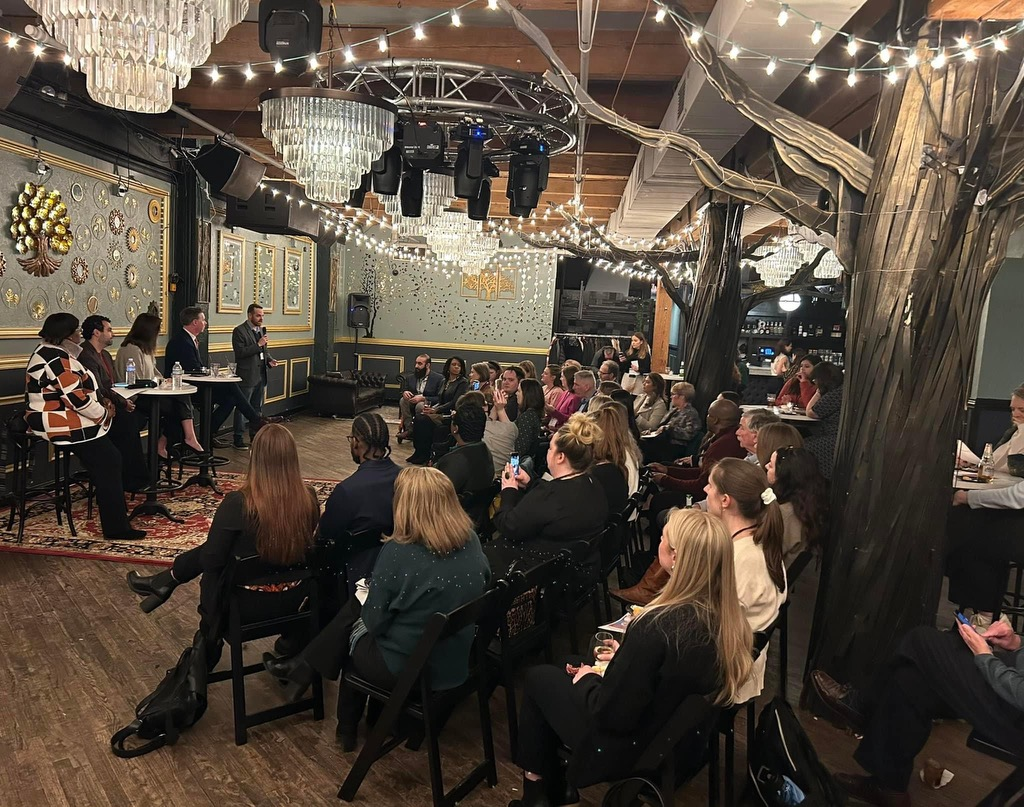
By Dominic Calabrese, Past PCC President
The state of mental health reporting, including what the media gets right and what it gets wrong, was discussed by a panel of experts at PCC's February 7th meeting.
The event took place at Hubbard Inn in Chicago's River North area.
Participating were Mark Ishaug, CEO, Thresholds; Alexa James, CEO, NAMI Chicago; and Juan Carlos Linares, President and CEO, Association House of Chicago. Serving as moderator was Darcel Rockett, Senior Journalist, Chicago Tribune.
"I'd have to say that by and large, the media is getting it right when it comes to covering mental health," Ishaug says, emphasizing that while progress has been made, many challenges remain due to the complex nature of the topic and the fact that it is so closely interwoven with other problems like housing, transportation, employment and health care.
James agrees, observing that the conversation around mental health has definitely become more elevated with journalists showing more empathy for those experiencing it.
Linares expresses hope for the future because young people, including members of Generation Z, seem to be more tolerant and accepting of individuals coping with mental health issues.
"Unlike other generations, they are shying away from the offensive terms of the past and seem to possess more understanding," he states.
In addition to changing attitudes, Linares points to improvements that have been made in the working conditions of mental health workers.
"They no longer accept rock bottom wages nor should they," he maintains, receiving loud applause from the audience.
Still he observes that mental health treatment is not getting the full funding it deserves.
"Illinois is a wealthy state, and with more governmental units than any other, so we have a right to ask where is this money going and why can't mental health get more?"
All three panelists maintain that many individuals suffering from mental health issues are also coping with challenges in housing and transportation.
Linares points out, for example, that in many of our most impoverished communities, there isn't adequate public transit for clients to access the treatment they need.
"And these problems must be addressed if we are ever going to fully solve the mental health crises in America," James maintains.
In terms of what the media can do better in terms of its mental health coverage, she points to the need for journalists to more fully work through their stories.
Ishaug concurs, stating that while most reporters already have figured out the beginning and end of their stories, they need to come to organizations like those represented by the panel to get that all important background information and history to provide context.
"As an example, homelessness can often be a lifestyle for some individuals coping with mental health problems but in order to adequately cover that issue, you need to possess an historical perspective on homelessness," he says.
Another suggestion that the panel has for the media is to tell stories about mental health that convey positive messages about family, purpose, responsibility, the work ethic and having hope for the future.
"Words matter," says Linares, and "journalists can help alter false and outdated perceptions that the public still might have about individuals coping with mental health challenges."
James spoke for her colleagues when she emphasizes that all three panelists are happy to serve as informational resources for any reporters covering mental health as well as PR people who may have clients in that area.
"Reporters already have a lot on their plate, so how could they possibly know everything about a particular mental health issue, she says, adding. "All of us are happy to help."
From her perspective as a journalist, Rockett says that she welcomes a chance to have coffee with any of the panelists to learn more.
"Any time that we can broaden our horizons, garner additional information and develop stronger ties to mental health organizations is a plus," she says.
Turning to social media, the panel notes that while it can be uplifting in terms of providing a platform in which young people can talk to each other, they emphasize that there is no substitute for face to face contact.
"Real people need real connections," Ishaug maintains.
Still they insist that social media, if it used responsibly to provide information and support, has a positive role to play.
Another issue that the panel addressed was the stigma about mental health that exists in many black and brown communities and the systemic racism that remains a roadblock to treatment.
In addition to calling for an expansion of local response teams to every part of the city, Ishaug notes the importance of achieving equity.
"At Thresholds, all our policies are driven with a need to achieve racial justice and equity," he states.
He also notes that in one way or another, all of us have been or will be impacted by a mental health related challenge at some point in our lives and we need to address the problem collectively.
"Mental health is really about all of us," Ishaug maintains. "Whether it may be personal grief or depression that we may feel over the passing of a loved one or a family member coping with a problem like alcoholism, all of us are impacted by mental health so we must solve it by working together."